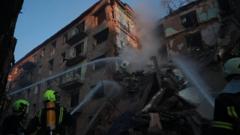In a strategic diplomatic meeting, President Putin offers veiled support to Iran but refrains from criticizing the U.S. or Israel amid ongoing military tensions.
Putin Meets Iran's Foreign Minister Amid Israel-Iran Conflict

Putin Meets Iran's Foreign Minister Amid Israel-Iran Conflict
Russian President Calls for Support Without Blaming U.S. or Israel
June 23, 2025, 9:10 a.m. ET – In a significant diplomatic development, President Vladimir V. Putin hosted Iran’s Foreign Minister, Abbas Araghchi, in Moscow, marking the first high-profile interaction between the two nations since the escalation of conflict initiated by Israel on June 13. As Israel intensifies its military actions against Iranian assets, which include attacks on nuclear facilities and air defenses, Russia has found itself in a delicate position. Their historical alliance with Iran is now tested by the need to navigate U.S. influence and regional relations.
In a cautiously worded statement, President Putin condemned the “absolutely unprovoked aggression against Iran,” describing the Israeli actions as “unfounded and unjustified.” He also indicated efforts by Russia to support the Iranian people. This diplomatic overture follows recent military interventions by the U.S., inadvertently complicating Russia's response to the escalating conflict.
Putin's interactions included discussions with not only Iran but also conversations with President Trump, and leaders of Israel and the UAE, highlighting Russia’s attempts to position itself as a mediator in the conflict. However, Putin's addressing of the issue managed to avoid any explicit condemnation of the U.S. or Israel, in contrast to Minister Araghchi's more direct criticisms regarding “aggressive actions” from both nations.
In a bid to balance support for Iran while maintaining diplomatic relations with the U.S., Kremlin spokesperson Dmitri S. Peskov reiterated Russia's alignment with Iran, but steered clear of any commitments that might provoke further tensions or draw resources from Russia's ongoing military engagements in Ukraine. He indicated that future support for Iran would depend on its expressed needs, leaving open the scope for potential military assistance without laying out a formal plan.
As the situation unfolds, the responses from both Iran and its adversaries will dictate the next steps in this complex geopolitical landscape, with Russia's role as mediator potentially becoming increasingly pivotal as fighting continues.
In a cautiously worded statement, President Putin condemned the “absolutely unprovoked aggression against Iran,” describing the Israeli actions as “unfounded and unjustified.” He also indicated efforts by Russia to support the Iranian people. This diplomatic overture follows recent military interventions by the U.S., inadvertently complicating Russia's response to the escalating conflict.
Putin's interactions included discussions with not only Iran but also conversations with President Trump, and leaders of Israel and the UAE, highlighting Russia’s attempts to position itself as a mediator in the conflict. However, Putin's addressing of the issue managed to avoid any explicit condemnation of the U.S. or Israel, in contrast to Minister Araghchi's more direct criticisms regarding “aggressive actions” from both nations.
In a bid to balance support for Iran while maintaining diplomatic relations with the U.S., Kremlin spokesperson Dmitri S. Peskov reiterated Russia's alignment with Iran, but steered clear of any commitments that might provoke further tensions or draw resources from Russia's ongoing military engagements in Ukraine. He indicated that future support for Iran would depend on its expressed needs, leaving open the scope for potential military assistance without laying out a formal plan.
As the situation unfolds, the responses from both Iran and its adversaries will dictate the next steps in this complex geopolitical landscape, with Russia's role as mediator potentially becoming increasingly pivotal as fighting continues.























